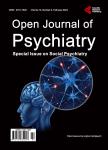Prevalence and Factors Associated with Anxiety and Depression in Expectant Mothers at Parakou in 2018
Prevalence and Factors Associated with Anxiety and Depression in Expectant Mothers at Parakou in 2018作者机构:Medicine and Medical Specialties Department Faculty of Medicine University of Parakou Parakou Benin National School for Higher Technicians Training in Public Health and Epidemiology (ENATSE) University of Parakou Parakou Benin Faculty of Health Sciences University of Abomey-Calavi Abomey-Calavi Benin
出 版 物:《Open Journal of Psychiatry》 (精神病学期刊(英文))
年 卷 期:2019年第9卷第3期
页 面:235-247页
学科分类:1002[医学-临床医学] 100214[医学-肿瘤学] 10[医学]
主 题:Anxiety Depression Social Determinants Expectant Mothers
摘 要:Background: Anxiety and depressive disorders can disturb the development of pregnancies. The goal was to study the prevalence and factors associated with anxiety and depression in expectant mothers followed in public maternity wards of Parakou in 2018. Population and methods: It was a cross- sectional study which consisted in an exhaustive census and a consecutive recruitment of 835 expectant mothers from June 14th to September 14th, 2018. Data collection was realized through interview between the investigator and the respondent basing on a questionnaire in which were integrated Edinburgh Postnatal Depression Scale-3 (EPDS-3), EPDS and modular Integrated Household Living Conditions Survey (IHLCS-2015) to assess respectively anxiety, depression and expectant mothers’ socio-economic level. Results: The prevalences of anxiety and depression were respectively 44.91% and 35.33%. Many factors were associated with anxiety and depression. Low socio-economic level increased 6.7 times the risk of developing anxiety (OR = 6.70;IC95% [2.83 - 13.00];p = 0.000) and 8.64 times the risk for the onset of depression (OR = 8.64;IC95% [3.09 - 17.18];p = 0.000). Celibacy increased 2.67 times the risk of developing anxiety (OR = 2.67;IC95% [1.19 - 5.98];p = 0.000) and 2.18 times the one of depression (OR = 2.18;IC95% [1.07 - 4.40];p = 0.000). Low economic level and celibacy were the main psychosocial determinants of anxiety and depression in expectant mothers. Conclusion: The implementation of multidisciplinary action program centred on improving purchasing power would reduce the risk of anxiety and depression in expectant mothers.



